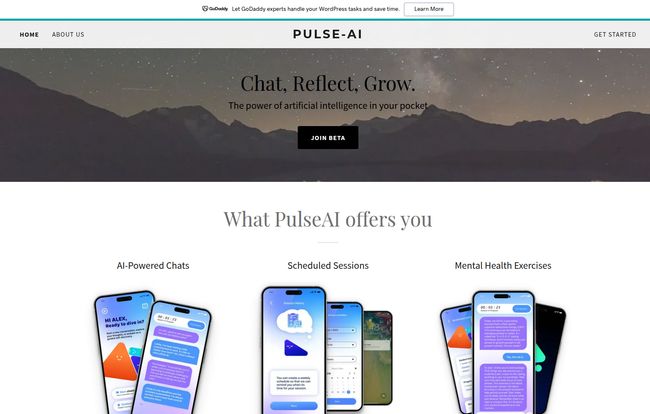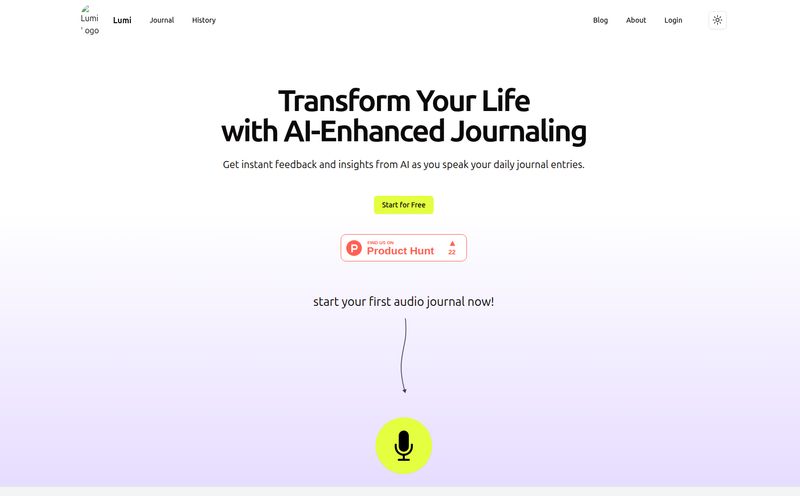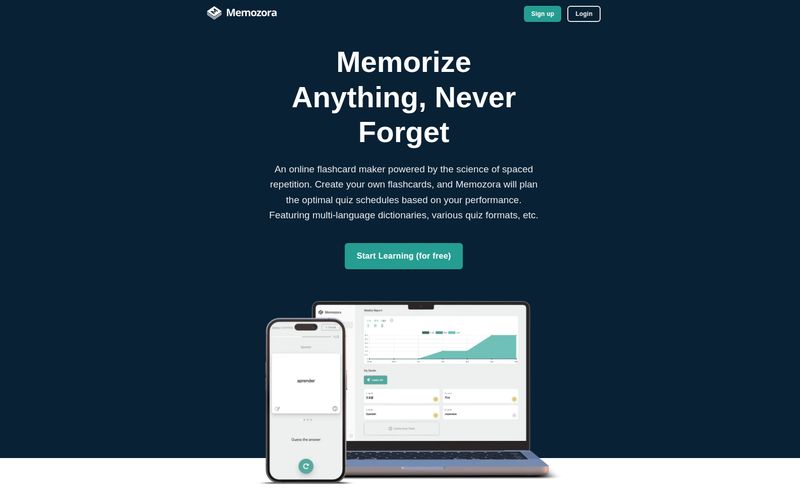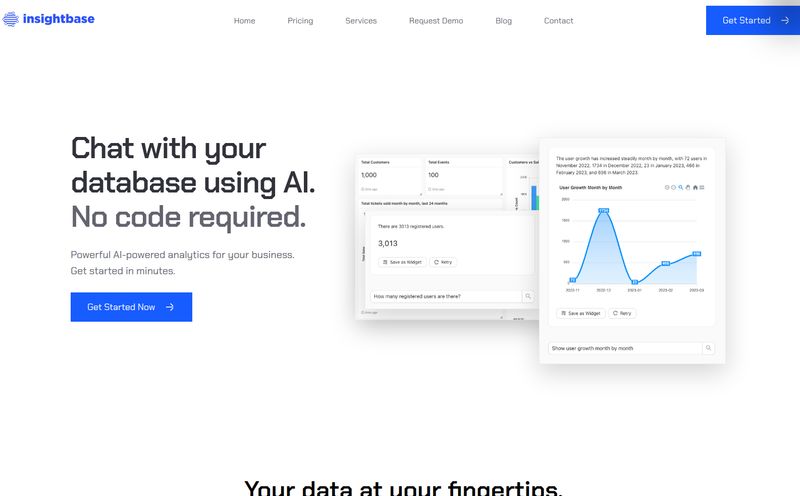The world of digital marketing, SEO, and constant trend-chasing is a pressure cooker. We're always on, always analyzing, always trying to be one step ahead of the next algorithm update. It can be… a lot. My brain often feels like it has way too many tabs open, and finding a moment to just process it all is a luxury. So when a tool like PulseAI pops onto my radar, promising “the power of artificial intelligence in your pocket,” my curiosity is definitely piqued.
We've seen AI for copywriting, AI for image generation, AI for coding. But AI for your mental space? That feels different. More personal. It’s a fascinating, and slightly weird, new frontier. I’ve spent years generating traffic and analyzing user behavior, so I couldn't resist taking a look at a platform designed to help users analyze their own internal traffic. Is this just another tech fad, or is there something genuinely useful here? Let’s find out.
So, What Exactly Is PulseAI?
At its heart, PulseAI is an AI-powered mental wellness companion. Think of it less like a doctor and more like a digital journal that actually talks back. The whole idea is built on a simple but powerful mantra: Chat, Reflect, Grow. It’s designed to be a private space where you can talk through your feelings, untangle your thoughts, and engage in exercises that build mental resilience. It’s not about diagnosing you; it’s about providing a tool for self-reflection. I've always found that just verbalizing (or typing out) what's in my head can bring incredible clarity. This app wants to be the sounding board for those moments.
It aims to be that non-judgmental friend you can message at 2 AM when your mind is racing about a campaign that's underperforming or, you know, the meaning of life. A pretty ambitious goal for a piece of code, right?

Visit PulseAI
A Closer Look at the Features
An app is only as good as its features, and PulseAI has a few core components that make up its experience. It's a pretty straightforward setup, which I appreciate. No one needs a complicated interface when they're already feeling overwhelmed.
The Heart of the Matter: AI-Powered Chats
This is the main event. The platform offers intuitive conversations with its AI to help you articulate your feelings. Whether you’re celebrating a win or navigating a tough day, you can just… chat. For me, this is the most intriguing part. We've all gotten used to talking to Siri or Alexa, but this is about emotional conversation. The potential is huge. It could be a fantastic way to get thoughts out of your head and into a structured format without the fear of being judged or misunderstood.
Building a Habit with Scheduled Sessions
I love this. In the chaos of a work week, it's easy to let self-care slip. PulseAI allows you to set up weekly chat sessions. They call it a “coffee date, but with your mind,” and that analogy is spot on. Consistency is everything, whether you're building a backlink profile or a mindfulness practice. Making an appointment with yourself, even with an AI, is a powerful way to carve out that essential time for reflection. Its a simple feature, but a really smart one for encouraging long-term use.
Mental Health Exercises: A Mini-Workout for Your Mind
Beyond the open-ended chats, the app offers curated exercises. Think of it like a mini-workout for your brain. These are likely guided prompts, breathing exercises, or structured reflection techniques designed to boost mental clarity and resilience. As someone who can get stuck in analytical loops, having a structured activity to break the cycle is a huge plus. It’s the difference between aimlessly wandering around a gym and following a targeted workout plan.
Tracking Progress with Session Insights & Analytics
Okay, the SEO in me is geeking out over this one. After your chats, PulseAI provides a concise summary and analytics. You can track your feelings, insights, and overall progress over time. Data! Beautiful, wonderful data. But instead of tracking keyword rankings or click-through rates, you’re tracking your own emotional trends. Seeing this progress visualized could be incredibly motivating. It helps you connect the dots between your activities, your feelings, and your overall well-being. This is where I think the “Reflect, Grow” part really comes to life.
The Elephant in the Room: Is My Data Safe?
Let's talk privacy. If you're going to pour your most intimate thoughts into an app, you need to know it's a vault. PulseAI states that it uses end-to-end encryption for all chats, journals, and dialogue. This is non-negotiable, in my opinion. It means that, in theory, only you can access your data. Not the company, not advertisers, nobody.
In an age where data privacy is a constant battleground, this commitment is reassuring. Some might still be skeptical—and healthy skepticism is good! But seeing E2EE listed as a primary feature shows they understand the gravity of what they’re handling. It’s a necessary foundation of trust. Without it, the entire concept would fall apart.
The Human Side of AI: A Tool, Not a Therapist
So, can an AI really be a companion? It’s a valid question. And the creators of PulseAI seem to agree. One of the first things they clarify in their FAQ is that PulseAI is not a replacement for professional therapy. And thank goodness for that. An AI can't understand the deep, complex tapestry of human experience, trauma, or serious mental health conditions.
But that’s not what it’s trying to do. Where it can shine is in accessibility and immediacy. It’s there 24/7. It doesn’t get tired. It doesn’t have its own bad day. For day-to-day stress management and self-reflection, it could be an incredible ally. Some people argue that relying on an AI for emotional support is a step in the wrong direction, but I see it differently. I think tools like this can be a fantastic 'first step' for people who might be hesitant to talk to another person, or as a supplementary tool alongside traditional therapy. The effectiveness, of course, depends entirely on the user's honesty and engagement. You have to be willing to put in the work.
What’s the Price of Peace of Mind?
Here’s the million-dollar question. As of right now, PulseAI is in a beta phase. The website has a big “JOIN BETA” button, which suggests it’s still in the testing and refinement stage. I did a little digging for a pricing page, but came up empty—not surprising for a product that hasn't fully launched yet.
This usually means one of two things: it’s free during the beta period to gather users and feedback, or the pricing model is still being decided. I'd wager we'll see a freemium model emerge, maybe with a certain number of free sessions per month and a premium subscription for unlimited access and advanced analytics. This would align it with other popular wellness apps like Calm or Headspace.
My Final Thoughts on PulseAI
As someone who lives and breathes tech and data, I’m cautiously optimistic about PulseAI. It's entering a crowded wellness market, but its focus on conversational reflection and data-driven insights gives it a unique angle. It’s not trying to be a guru or a doctor; it’s positioning itself as a smart, private tool to help you understand yourself better.
This isn't a magic wand. It's a tool. And like any tool, its value comes from how you use it. But for the busy professional, the introspective student, or anyone who just needs a space to think out loud, PulseAI could be a powerful and convenient addition to their mental wellness toolkit. I'm genuinely excited to see how it develops post-beta.
Frequently Asked Questions about PulseAI
What is PulseAI?
PulseAI is an AI-powered mobile app designed to be a mental wellness companion. It uses AI chats, structured exercises, and analytics to help users reflect on their feelings, organize their thoughts, and grow their self-awareness.
Is my data safe with PulseAI?
PulseAI emphasizes user privacy. They state that all user data, including chats and journal entries, is protected with end-to-end encryption. This means only the user should be able to access their personal conversations and insights.
How much does PulseAI cost?
Currently, PulseAI is in its beta phase, and specific pricing has not been announced. It's common for apps in beta to be free to use. A subscription or freemium model is likely after the official launch.
Is PulseAI a replacement for professional therapy?
No, absolutely not. The platform itself is clear that it is not a substitute for professional mental health care from a licensed therapist or psychologist. It is intended as a supplementary tool for self-reflection and mental wellness, not for diagnosis or treatment of clinical conditions.
How does the AI chat actually work?
The AI chat likely uses a sophisticated Large Language Model (LLM), similar to other modern chatbots. It's trained to understand natural language, recognize emotional cues in text, and respond in a supportive, conversational, and guiding manner to help you explore your thoughts more deeply.
Who is PulseAI best for?
PulseAI seems ideal for individuals looking for a private, accessible way to practice self-reflection and manage daily stress. It's for people who are comfortable with technology and want a tool to help them build healthier mental habits, track their emotional state, and gain personal insights.
Reference and Sources
- PulseAI Official Website
- National Institute of Mental Health - Technology and the Future of Mental Health Treatment



